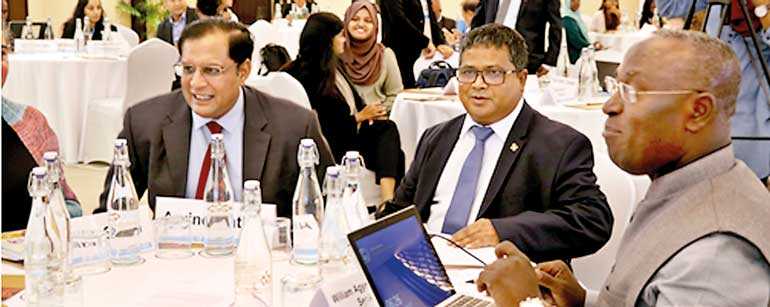Wednesday Feb 18, 2026
Wednesday Feb 18, 2026
Tuesday, 17 September 2019 00:00 - - {{hitsCtrl.values.hits}}

The participants

Closing session: From left: ILO Office for Sri Lanka and the Maldives Country Director Simrin Singh, UNFCC William Kojo Agyemang-Bonsu, Minister of State for Environment Ahmed Mujthaba, Poland Climate Champion Thomas Chruszczo

From left: WHO Representative and UN Resident Coordinator Dr. Arvind Mathur, Maldives Minister of Environment Dr. Hussain Rasheed Hassan, and UNFCCC’s William Kojo Agyemang-Bonsu
ILO News: The ripple effects of climate change and its impact on the future of work cannot be ignored any longer. Sri Lanka is identified among the top countries most vulnerable to climate risk. Maldives is currently grappling with rising sea levels associated with climate change, water shortages, crop damages and increasing sea surface temperature – troubling changes to a country which relies heavily on fishing and tourism for economy and employment. 12 out of 20 countries most affected by disaster risks globally are situated in the Asian region.
It has never been more crucial for countries in the region to assess and address climate change responses, especially within the world of work.
The International Labour Organization (ILO) along with the UN Climate Change Secretariat (UNFCCC) organised an Asia-Pacific region workshop to discuss maximising the positive and minimising the negative impacts of implementing climate change response measures. The three-day workshop held last week was hosted by the government of Maldives.
This multi-stakeholder undertaking brought together academics, researchers, practitioners, civil society, climate change champions as well as government, employer and trade union representatives from Maldives on the impacts of Response Measures, underscoring the importance of partnerships and capacity building.
“We need to be clear that climate change threatens jobs and economies. The need for shaping a just transition is now or never. It is crucial that long-term measures and partnerships in the context of climate action are put in place. We cannot think about global technological developments and the future of work in the region without considering just transition, decent work, skilling for green jobs and economic diversification in the backdrop of these pressing changes,” highlighted ILO Country Office for Sri Lanka and the Maldives Country Director Simrin Singh.
“This year, the ILO celebrates its centenary. The ILO’s Future of Work and Green Initiatives were created to shape the agenda of the Organisation into the next century and enable just transitions into more sustainable future as more than 1.2 billion jobs depend on stable environment and ecosystems.
The sessions at the workshop outlined that these impacts are often regressive, affecting the vulnerable and contributing to increasing inequality. Participant explored the economic models available to understand social and economic impacts and policies for diversification, noting that taking action on climate change has profound impacts on the labour market. While outlining the challenges, the workshop also emphasised the vast opportunities that could be availed with a shift towards resilient low-carbon economies